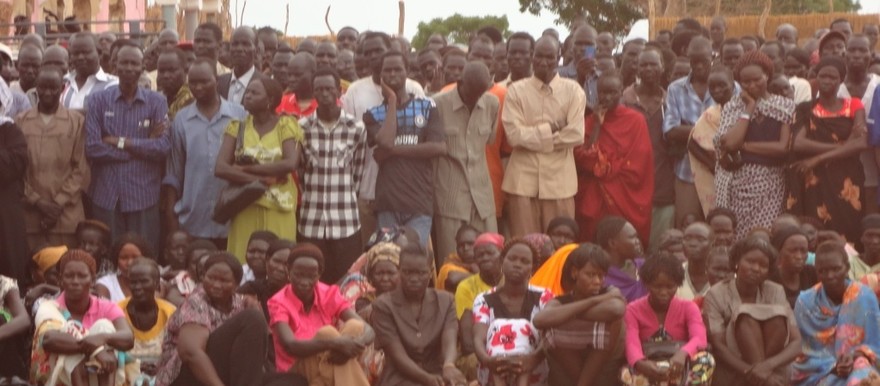Analysis: A chief’s death

Five hours into the negotiations, the tense standoff unexpectedly reached its climax. What exactly ignited the tragic denouement somewhere along the road linking Difra to Abyei town remains at present time unknown. Its deadly consequences were felt, however, in both Juba and Khartoum with fears of the worst for the peace process between South Sudan and its northern neighbor. Paramount Chief Kuol Deng Kuol had been shot dead.
Returning from a field visit some fifty kilometers north-east of Abyei town, an armored convoy carrying the Dinka Ngok delegation came to an abrupt stop. Blocking the road was an unidentified group of Misseriya gunmen with AKs and RPGs. They swiftly laid siege to the vehicles, demanding a parley with the UN peacekeepers that escorted them. It would later be claimed that these militants were angered by the unapproved tour of the Dinka leaders through land claimed by the Arab nomadic tribe.
While Major General Yohannes Tesfemariam, commander of the UNISFA deployment, tried to reason with the assailants who demanded that the UN force hand them over the tribal leaders, Chief Kuol and his cohort waited anxiously inside their cars. Calls were made to the authorities in Abyei town, Juba and Khartoum by the UN staffers, in order to find a peaceful way out. But the disobliging aggressors would not leave until they had secured custody of the Dinka chiefs. As the hours passed, the negotiations stalled. Until they went awfully wrong. The rest is now history.
How this unfortunate incident will affect the future relations between the two nations remains to be seen. Its exploitation by one side or the other could prove particularly dangerous for the stability of Abyei. Popular passions are easy to inflame in the disputed region, and distrust between the Misseriya and the Dinka has only grown deeper by the day since the 2011 independence.
The Abyei incident, however, may instead serve as a concrete, if tragic, building block for more peaceful relations between the South and the North. Indeed, if anything, the days since the killing have illustrated that the two neighbors may finally be starting to grasp the necessity of more restrained dealings with one another. Chief Kuol’s death could serve as a moment for dropping the use of guns and embracing instead the use of international law and diplomatic channels.
No major fighting has followed Kuol’s assassination – instead there has been a war of words. And condemnations, complaints and accusations, no matter how bitter, still please the ears more than bullets’ deadly drone. Salva Kiir’s government has aimed to shift blame for the killing from the Misseriya to the Government of Sudan. In a speech last Thursday in Juba, Kiir portrayed the Misseriya as respected neighbors and partners who could not have possibly taken the life of the Dinka chief on their own. Rather, “It is the government of Sudan which killed the chief. It is not the Misseriya we know – the ones that move with their cattle south of Abyei every year looking for water and pastures land”, he told his audience.
Kiir’s speech had the political quality of appeasing the outrage of his Dinka kinsmen towards the Arabs to focus it on the more impersonal and faraway entity of the Sudanese government. A tragedy that could have been left to the masses or the SPLA to avenge entered the realm of high-level politics, international law and diplomacy – making the State the sole and unique custodian of the dispute.
The politicians have definitively assumed responsibility for follow-up on the incident, as Kiir made clear on the day following the killing: “This is sad. No one had expected this to happen at a time when we have accepted to give peace a chance. President Bashir and I have accepted and declared at the press conference here when he visited Juba to work together for peace. I know it pains but this should be left to the government to see what to do. And I only want to assure you that I am certain that Abyei will one day come to the south at any cost.”
Through the elevation of Chief Kuol’s death to a martyr-like targeted assassination, its fierce condemnation and its subtle political recuperation, the Juba government aims to convince its own military, tribal constituents and civilian audiences that it won’t leave the incident unpunished and that it is knows best how to react to the killing. Its tempered and law-abiding protestations at the UN, on the other hand, aim to demonstrate internationally a commitment to regional peace.
Finally, Juba’s indictment of the Khartoum government and formal request for an inquiry elevates the incident to the political level to which it belongs, while discharging President Kiir from any immediate responsibility to act and preserving a victim-like position for future political leverage for coming negotiations on the status of Abyei.
The political exploitation of the drama for internal and external strategic purposes suggests an emerging rationalization of unexpected events by the South Sudanese leadership within the context of existing security agreements. Juba’s restraint shows that it increasingly understands where its national interests lie and forces Khartoum to apply the same reflexes and strategies.
Kuol’s killing definitely could have been a pretext for war. It could have led (and still could) to a cycle of revenge killings out of the public light. But instead both sides focused on the diplomatic, legal and political aspects of the case. One thing is sure: for the sake of economic development, peace and internal stability, both sides have an acute interest in elevating Chief Kuol’s death to a symbolic level as a stepping stone on the road to stronger relations and in turning the page on this tragic incident.
By Jonathan Pedneault
Photo: Mourners at the last rites for Sultan Kuol Deng Kuol, Abyei, 8 May 2013 (Radio Tamazuj)